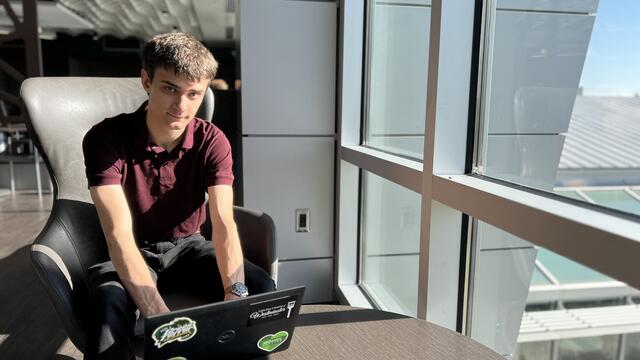Systems engineering internship prepares Computer Science major for national security career
National Security Fellow Liam Estell, a Computer Science major and Political Science minor, interned with Peraton Inc., bringing him one step closer to his dream career as a programmer supporting national security efforts.

Sophomore Liam Estell of Ellicott City, Maryland, has programmed as a hobby for years now. He’s programmed his own scripts to run on his computer — like one that helps him quickly navigate the web using keywords — and has spent time creating and implementing mods (short for modifications) to the source code of popular video games with friends — “and do troubleshooting for when they inevitably don’t work,” he says.
“A lot of what I do both in hobby stuff and more professional stuff has been geared toward user engagement,” he says, and this intersection of skills has carried over from hobby to classroom and career success during his time on the Hill.
This summer, Estell, who is a Computer Science major with a Political Science minor, interned with Peraton Inc., a defense contractor, as a systems engineer contractor working at a customer site.
“Systems engineering involves design and part of the implementation of creating large computer systems. The design process involves making diagrams and writing up several hundred pages of documentation describing how the system will behave and interface with every other system,” he says, comparing systems diagrams to plain English instruction manuals.
While working on his systems diagrams, Estell was involved in many meetings between the developers and their customers.
Much like creating Minecraft mods for his extended friend group to use, he had to think about the legibility of his diagrams for a broad group of people.
“Systems diagrams need to be intelligible to consumers outside of the people who are developing them. So, the diagrams I was making were not for the developers, they were by the developers for general users of the systems,” he says.
It required a lot of project management and meeting with other systems engineers to discuss techniques and set goals. He observed how the engineers oversaw development teams to create the systems through coding and gained a firsthand look at the long-term support stage for a project that had already taken years of design work.
“It was definitely a very valuable internship,” Estell says, having witnessed how partnerships between systems engineers, developers, and customers operate on a large scale. While he’s grateful for his experience in systems engineering, Estell remains highly interested in actual programming, which designers don’t typically do.
With this internship experience and his position as a National Security Fellow, he’s certain that his path leads to the national security sector.
“I’m interested in pursuing a career at the National Security Agency (NSA), particularly in cybersecurity,” he says.
“McDaniel has a very strong relationship, mostly through Dr. Francis Grice, with the National Security Agency, and that is the primary reason that I chose McDaniel. It was both the small class sizes and the strong relationship with the NSA.”
“McDaniel has a very strong relationship, mostly through Dr. Francis Grice, with the National Security Agency.”
National Security Fellows benefit from guest speakers each year, many of whom are national security experts affiliated with government agencies. “Those have been great,” Estell says.
His Computer Science courses, like Data Structures and C++ Programming, have been enhanced by his summer internship experience — in some ways, putting him ahead of the curve: “What I’m doing in my classes this semester is really applicable to what I was doing in the internship, and I’m drawing a lot on what I did in the internship for my current courses.”
As the tutor for Introduction to Programming this year, he’s supporting first-year Computer Science students and recognizes how challenging coding can be for students without prior experience.
Although, for Estell, it’s always been a big part of his life. “My father is a programmer, so he’s been teaching me since I was seven,” he says. “And I did dual enrollment in high school at Howard Community College to take programming classes.”
When he isn’t coding, Estell is involved in a Magic: The Gathering student club and works as master electrician for campus theatre productions, leading the lights crew to ensure campus performers are always seen in the best light in WMC Alumni Hall.
It’s a leadership role with a lot of moving parts, which helps him to once again use a major skill: “I’m quite good at understanding complex systems. Something that I have a fair bit of experience in at this point is trying to take more complicated topics and make them more digestible.”